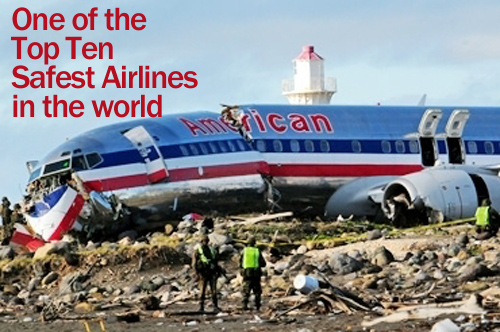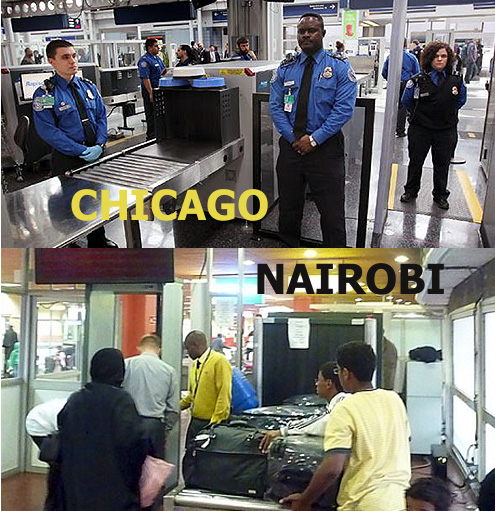Cheap flights should be a goal of every traveler, but we’re learning there are incredible hazards to knocking the price down too low.
My safari with the Cleveland Zoo began by sorting through the many troubles various travelers had with their flights from the U.S. into Africa. Much of what happened to a number of these 20 people has happened to many of our other travelers this season, so I though I should document the travails with some advice as to how to avoid such misery.
The first and likely most frequent problem is missing a connection. This happened to three wonderful ladies on the trip, Adela Kuc, Mary Bartos and Mercedes Lira, who the others on the trip began to call the “Newark-3″. This was a really big trip for all of them and their first time in Africa.
The missed connection resulted in a domino series of mistakes and incorrect remedies that became an outright catastrophe. They missed their connection in Newark by about 5 minutes, but they ended up missing two days on safari and were without their luggage for four days.
The Continental connection was missed because of weather, but the point here was that had they left on the previous earlier flight, they would have made their connection. That would have increased the scheduled connecting time from 1hr:50min to 5hr:50min. Understandably, that six-hour layover seems too long to most people.
But in today’s flying environment, it definitely isn’t if the only alternative is less than 3 hours. I consider this really the fault of Continental by suggesting in the first place that the shorter connecting time is just fine. It isn’t. Flights are miserably delayed, today, and whatever the airline says you need is probably only about half of what you really do.
But there’s more on this point. One of the Newark-3 wouldn’t have minded coming a bit early, except that it was more expensive. But clearly we need to realize in today’s skies that airlines never make their schedules, and the ultimate loss of two days on safari was certainly greater than the increment for the more expensive ticket.
And there’s even more to this sad story. Once the delay occurred, the presumed remedies we all expect didn’t happen.
Previous to today’s hyper-complicated airline alliance and code-share rules, if your connection was missed, it was incumbent upon the airline to do whatever was necessary to get you as quickly to your destination as possible. That meant even booking you onto a competing airline.
No longer. Depending upon the type (read: cost) of your ticket, you might be out of luck. Most CHEAP TICKETS, today, won’t allow booking across different airlines. New rules are in effect which differentiate the responsibility for missing the connection. In other words, the airline will only fault itself for its own mistakes: like mechanical connections or the pilot coming late. But if it’s weather – forget it Charlie, it’s your problem.
Two of the three ladies suffered even more egregious stress and delay, because the electronic ticketing process was faulty. Continental claimed that it couldn’t read the Kenya Airways’ proof-of-ticketing (the ladies were ticketed on Kenya Airways into Nairobi from Amsterdam) : i.e., that from Continental’s point of view, no ticket existed.
I really consider that bogus if technically true, since Continental had flown them from Cleveland to Newark on the same “faulty” ticket. Why the first flight was acceptable but the subsequent flights weren’t is close to high throne hogwash. They call it a rule.
When Continental endorsed over the remaining ticket it could read to British Airways, British Airways refused to recognize it, because Continental’s electronic rewriting process wasn’t recognized in the BA system. This meant that one of the ladies was racing back and forth in the Newark terminal carrying one airline contention to the other and … never getting out of Newark.
Whose fault was this? Continental or British Airways. I’d hang them both.
Ultimately the three ladies made it to Africa, two days late, and more than $2000 more than expected out of pocket for new hotels, new transfers and new local flights. They came in different ways, for no understandable reasons, and their luggage was delayed even longer.
It would take a Ph.D thesis to unweave the whys and wherefores of exactly what happened to them, but I think as a lesson for the future we need to understand that airlines, today, are poorly managed companies losing tons of money with very stressed employees.
Don’t buy their stock, but if you buy their tickets, follow these four rules:
(1) At big metropolitan airports like Newark, Chicago, L.A., Atlanta or New York – and probably a lot of others, too – always give yourself a minimum of 4 hours connecting time. And if your choice is only 6 or 3, take 6.
(2) If you’re on a big trip, like a safari, make sure you add at least one dead day to the beginning of your trip. This takes care of the possibility you’ll be delayed.
(3) Consider insurance more seriously than before. I know that filing for the insurance after a situation like the Newark-3 would become a nightmare in itself, since the documentation of who did what when is complicated. And to successfully invoke insurance, you’ll have to take copious notes of the struggle as it’s happening. But this will cover you for the inevitable loss.
(4) Don’t jeopardize a multi-thousand dollar trip by saving a few hundred dollars on a CHEAP TICKET that connects between too many different airlines. The more airlines in your itinerary, the more complicated it will be to sort out any problem. Code-shares are better than separate airlines, but even code-shares won’t guarantee you as quick a remedy as just sticking with one airline through the whole program. If you have to use more than one airline, you should consider overnighting at the connecting point between the two airlines.
I felt terrible for Mary, Adela and Mercedes; and terrible for Wayne and Margot Gilbert whose Continental departure from Cleveland at 8:25p one night was finally canceled altogether at 3 a.m. And for Angry and Frank Kasper who after dozens of changes on Northwest and KLM found out the day of their departure that they’d been put on separate planes to Europe!
Or for myself, who after my pilot told us cheerfully it was the 90th anniversary of American Airlines then came on the P.A. ten minutes later to apologize for an hour delay due to “paper” problems.
Paper problems?! I thought that ended when I was sent to the principal’s office for sailing paper airplanes at Mrs. Biggin’s desk!
 The airline you’re going to fly next week isn’t considered among the safest? Should you cancel? And what was that report out this week?
The airline you’re going to fly next week isn’t considered among the safest? Should you cancel? And what was that report out this week?